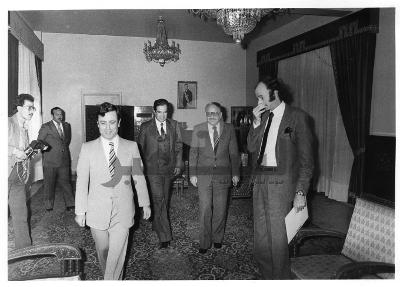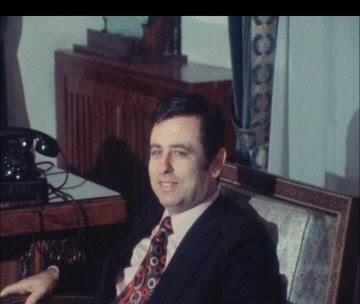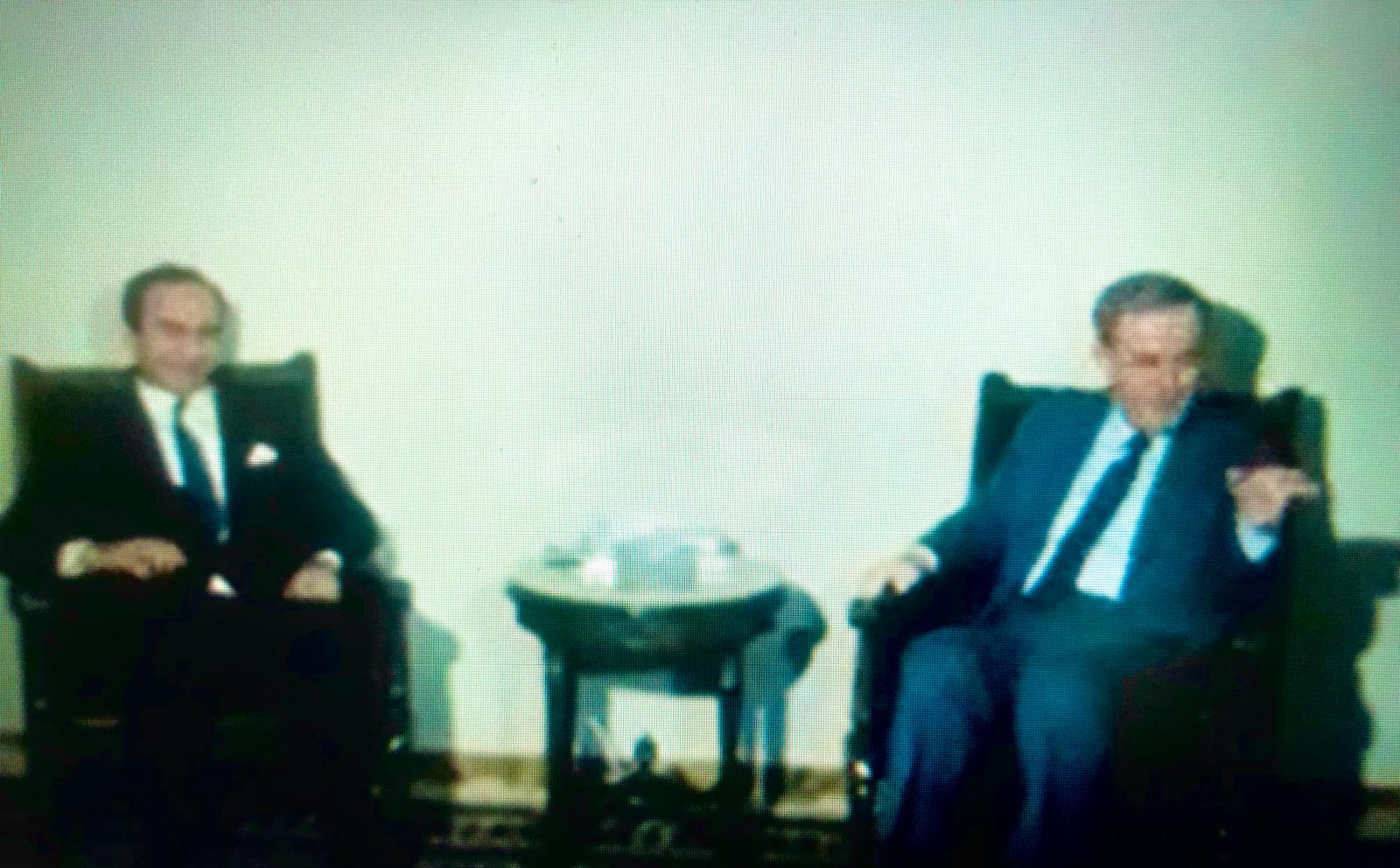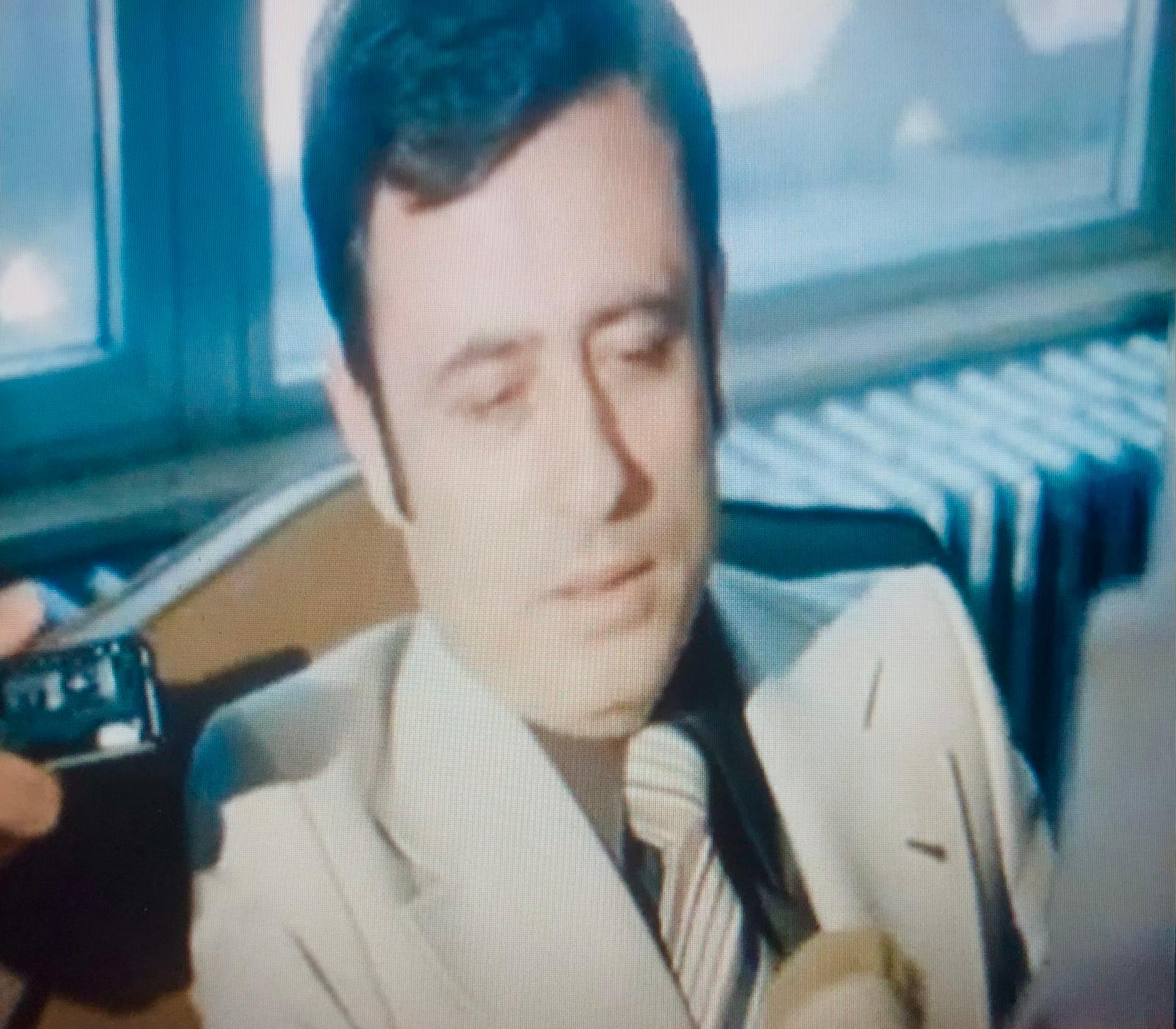Syrian Foreign Minister Abdul Halim Khaddam today rejected the U.S.-negotiated accord for withdrawal of Israeli troops from Lebanon. He also warned of an even wider military conflict between his country and Israel than last summer’s fighting in eastern Lebanon.
Khaddam said after talks here between Saudi King Fahd and Syrian President Hafez Assad that Syria rejected the draft accord because it would end the state of war between Israel and Lebanon, “and to do that is the responsibility of all Arab states and not just Lebanon.”
In Damascus, the Palestine Liberation Organization added its own sharp condemnation of the Israeli-Lebanese agreement, Washington Post correspondent Herbert H. Denton reported. A PLO executive committee statement warned the Beirut government that only the Palestinian people have the right to delineate Lebanon’s borders with Israel.
The Syrian and PLO positions are crucial to the fate of the agreement, because Israel has said that it will not withdraw its troops from Lebanon unless Syria and the PLO pull out their forces as well. Israel is estimated to have 30,000 troops in Lebanon, while Syria has 40,000 and the PLO between 6,000 and 8,000.
Khaddam issued a veiled threat to Israel that another conflict between the Israeli and Syrian armies in Lebanon would not be limited to Lebanese territory and said that casualties would be far higher than in last summer’s fighting. He added that while Syria took responsibility for defending its own territory, it expected the Soviet Union to fulfill all its commitments made under the Syrian-Soviet treaty of friendship signed in October 1980.
Eighty-seven Soviet Embassy dependents left Beirut on a special flight to Moscow, setting off rumors in the jittery Lebanese capital that the Russians were anticipating a Syrian-Israeli war, special correspondent Nora Boustany reported.
In the most comprehensive public statement yet by a Syrian official on the Lebanese-Israeli agreement, Khaddam said that it would limit Lebanon’s sovereignty, “paralyze” Lebanon’s Arab commitments, allow Israel to interfere in Lebanon through militia leader Saad Haddad and permit Israeli goods to flow into other Arab countries through Lebanon.
“We have informed our brothers in Lebanon of our rejection of this treaty,” he said in an interview with local Saudi reporters.
Khaddam’s comments appeared to constitute Syria’s total rejection of the draft agreement and an opening shot in a campaign to rally Arab support against what Damascus already is calling “another Camp David.” The PLO statement, which seemed carefully coordinated with the Syrian one, added to pressure on Lebanese President Amin Gemayel to back off from his support for the pact.
Khaddam’s remarks seemed particularly significant because they came just after completion of talks between Fahd and Assad during which the Saudis had been expected at least to urge Syria to consider carefully the merits of obtaining an Israeli military withdrawal before condemning the accord.
U.S. Secretary of State George P. Shultz, whose shuttle diplomacy put the finishing touches on the Israeli-Lebanese agreement, said yesterday that Syria had “not slammed the door” on efforts to get foreign forces out of Lebanon despite its hostility to the accord. Shultz met Assad Saturday.
In Paris, U.S. officials traveling with Shultz said that they could not comment on Khaddam’s statement until they had seen a full text and had time to analyze it, Washington Post staff writer John M. Goshko reported. But the officials said privately that the Syrian’s bellicose rhetoric was “about what we expected to hear” in the immediate aftermath of the Israeli-Lebanese agreement.
The officials, who declined to be identified, said that the United States believes that the Syrian government has not yet fully assessed the impact of the accord on Syrian interests and is likely to make sharply critical but nonspecific attacks on it for some time to come. The United States believes it could take from three to four months before there is a clear picture of whether Syria intends to cooperate with the effort to remove foreign forces from Lebanon.
The Syrian president arrived here early yesterday afternoon and held discussions with Fahd and Crown Prince Abdullah until the early hours of this morning. He met them again later in the day before departing for Damascus.
No official statement was released at the end of the talks, and the Saudis have yet to make known publicly how they feel about the draft Lebanese-Israeli accord.
Khaddam, however, openly criticized the agreement, which he described as “imposed” upon Lebanon by Israeli military occupation there.
According to an unofficial translation of his remarks, the Syrian foreign minister said the accord gave “priority” to Israel over all other agreements that Beirut had signed with other Arab governments and “paralyzed Lebanon’s Arab commitments” under the Arab League charter and the joint Arab defense pact.
He said that the accord represented “great dangers” to the Arab world’s economy and security because Lebanon would become “the gate” through which Israeli goods would flow into other Arab countries.
“This agreement limits Lebanon’s sovereignty and imposes joint security arrangements in Lebanese territory, which should have been otherwise the responsibility of Lebanon alone,” he remarked.
Israel, he said, still would be able to interfere in Lebanon through Haddad, the former Lebanese Army major whom the Israelis long have supported in southern Lebanon and to whom the draft agreement assigns a permanent role in ensuring Israel’s security in a special border zone there.
Khaddam gave no hint that Syria might be interested in bargaining over the draft accord or open to an American invitation to become involved in the Middle East peace process.
He said that trying to find a compromise between President Reagan’s Sept. 1 Middle East peace initiative and the Arab peace plan adopted in Fez, Morocco, later that month was impossible because the former contradicted all Arab resolutions. In addition, he said that the Reagan plan did not meet minimum Palestinian demands for self-determination in an independent state.
Warning of a possible new conflict between Israel and Syria, Khaddam said, “The Israelis know that if there is a new war, this one will not be confined to a limited area and that damage and casualties will be even greater.”
His comments about expecting Moscow to fulfill its commitments apparently referred to Soviet pledges of military support in case of aggression against Syrian territory. The Soviets already have replaced the arms that Syria lost last summer with more sophisticated ones and have increased Soviet military advisers to between 4,000 and 5,000, according to western and Israeli intelligence estimates.
The hard-line Syrian position as outlined by Khaddam appeared to be aimed at least partly at stonewalling any possible Saudi attempt to get moderate Arab nations to consider the Israeli-Lebanese agreement in a positive light.
Whether the Saudis were disposed to do this in the first place remains unclear. Shultz, upon leaving here yesterday morning, implied in his comments to reporters that the Saudis were not unsympathetic to the accord even if they had reservations.
Saudi Foreign Minister Saud Faisal said only that the kingdom remained determined “to continue to exert its efforts until a complete withdrawal is achieved from all occupied Arab territories.” But he specifically rejected any direct linkage between withdrawal of Israeli forces in Lebanon and those of Syria.
Syria’s official news agency said that Syria and Saudi Arabia agree that the Lebanese-Israeli draft accord “in its present form” could endanger Lebanon, Reuter reported from Damascus. reference to the draft’s present form possibly was a hint that Syria might accept a modified version, Reuter said.
Western analysts here believe the major Saudi objection to the accord is likely to center upon those aspects concerning the future normalization of relations between Israel and Lebanon. This could amount to a major split in Arab ranks similar to the one that occurred after Egypt’s signing of the peace treaty with Israel in 1979.
The Saudis have been working hard in the past few years to shape a joint Arab stand toward Israel and to launch peace negotiations acceptable to both hard-liners and moderates. Their efforts culminated in the Arab peace plan of Fez, which was based upon an earlier Saudi draft.
The Saudis are believed unlikely to do anything now that would seriously jeopardize the existing Arab consensus on these issues.
Saudi Arabia, analysts here predicted, now will take a wait-and-see attitude toward the Israeli-Lebanese accord until the stand of other Arab states becomes clear. But some analysts expressed doubts that the kingdom would stick out its neck on behalf of the United States by applying pressure on Syria.
The kingdom continues to provide Syria with $525 million annually under a commitment that it made at Baghdad in 1979 to the so-called front-line states facing Israel. It has, however, stopped payment to Damascus in support of Syrian troops stationed in Lebanon under the now-defunct Arab Deterrent Force.
Correspondent Denton added from Damascus:
The PLO executive committee’s statement called the accords a danger to the “Palestinian cause” and indicated that it intended to keep its forces in Lebanon until Arab states direct them to leave.
“The PLO affirms that its presence in Lebanon is governed by bilateral, Arab and international agreements which cannot be abrogated unilaterally or by an agreement with another party,” said the statement, which was carried by the Palestinian news agency Wafa.
“The PLO warns the Lebanese government against delineating any borders for Lebanon with the Zionist enemy, since the legitimate right to delineate borders with Lebanon belongs to the Palestinian people. The Lebanese government will bear national, pan-Arab and historic responsibility for any compromise or denial of this right,” the statement said.
“The PLO calls on all Arab states to reject this agreement and work collectively to protect Lebanon from its dangers,” it said.




